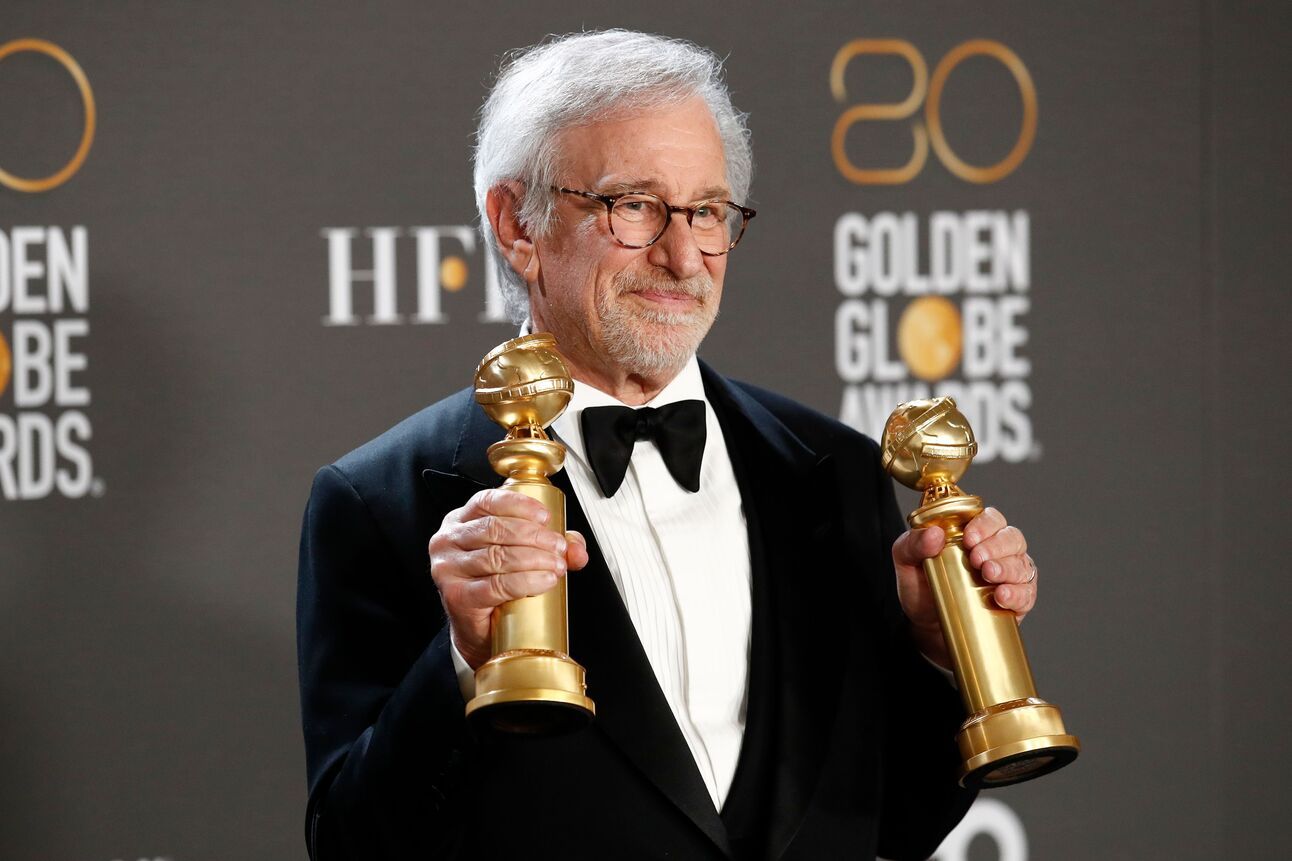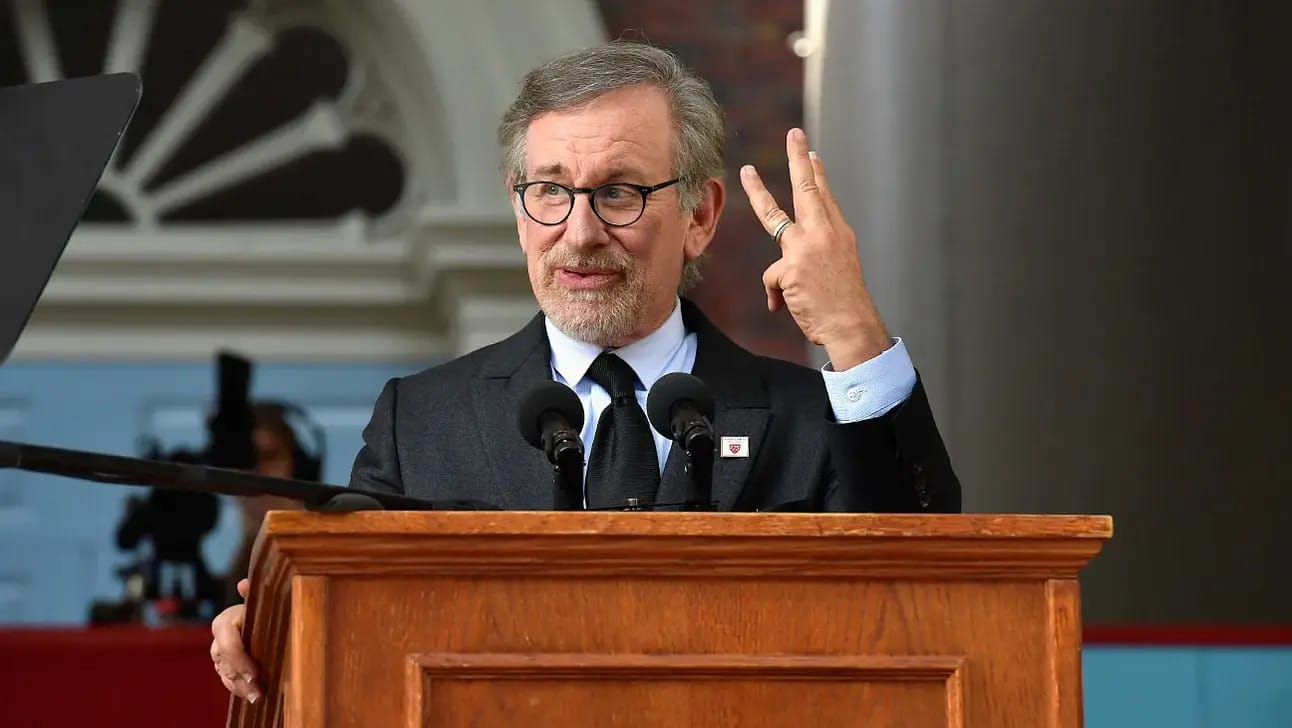- The Weekly Mensch
- Posts
- The Weekly Mensch: Steven Spielberg
The Weekly Mensch: Steven Spielberg
The quintessential understanding of creativity, universality, heritage, and transmission
Us in a Nutshell
We are passionate about the lives, the impact, and the experience of Jewish baby boomers who have changed our world. From finance to the arts, we write about the stories of contemporary heroes who — significantly and meaningfully — changed the face of their respective industries, often starting with nothing but a legacy of exile. We tell their stories for the timeless lessons of intelligence, ethics, and resilience they underline. And we also share some fun anecdotes! Nathan Tob is a fourth-year student at the Queen Mary University of London. He studies Economics, Finance, and Management. Davy Sokolski is a third-year student at Columbia University in New York. He studies International Political Economy.
What is a Mensch?
Leo Rosten defines mensch as “someone to admire and emulate, someone of noble character.” Dr. Saul Levine writes in Psychology Today that a mensch’s personality characteristics include decency, wisdom, kindness, honesty, trustworthiness, respect, benevolence, compassion, and altruism.
Steven’s Rapid Bio

Steven Allan Spielberg, born on December 18, 1946, in Cincinnati, Ohio, grew up in a Jewish household shaped by a deep connection to tradition and resilience. Raised by his mother, Leah Adler, a concert pianist and restaurateur, and his father, Arnold Spielberg, a pioneering electrical engineer, Spielberg’s early life was marked by frequent moves and experiences with antisemitism. These formative years profoundly influenced his identity and later became central themes in his work.
Spielberg’s passion for filmmaking began in his childhood when he used his family’s 8mm camera to create short films. After briefly attending California State University, Long Beach, he dropped out to pursue a career in film. His first breakthrough came with Amblin’ (1968), a short film that earned him a contract as the youngest director ever signed at Universal Studios. He quickly made his mark with the TV movie Duel (1971), which launched his career in Hollywood.
In 1975, Spielberg directed Jaws, the first-ever summer blockbuster, redefining cinematic success. This was followed by a series of iconic films, including Close Encounters of the Third Kind (1977), E.T. the Extra-Terrestrial (1982), Jurassic Park (1993), and the Indiana Jones franchise. His storytelling mastery blended spectacle with deeply human themes, making him one of the most influential filmmakers in history.
Spielberg’s Jewish identity came to the forefront with Schindler’s List (1993), a deeply personal film about the Holocaust that won seven Academy Awards, including Best Picture and Best Director. The film inspired him to establish the Shoah Foundation to document Holocaust survivor testimonies and ensure their stories would educate future generations. Beyond film, Spielberg is a dedicated philanthropist, supporting Jewish causes, Holocaust remembrance, and education through initiatives like the Righteous Persons Foundation and significant donations to institutions such as the University of Southern California.
Today, Spielberg’s legacy spans over five decades of groundbreaking cinema and social impact. From redefining Hollywood blockbusters to championing Jewish history and values, he remains a towering figure whose work continues to inspire and transform lives.
Steven’s Five Lessons
1. Find the extraordinary in the ordinary
Steven Spielberg built his career by finding wonder in the seemingly mundane. In E.T. the Extraterrestrial, he transformed a suburban neighborhood into the backdrop for one of cinematic history's most magical and heartfelt stories. The story of a lonely boy befriending an alien wasn't about dazzling sci-fi concepts, it was about childhood, family, and connection, rooted in Spielberg’s own experience as a boy isolated and different. Similarly, in Close Encounters of the Third Kind, Spielberg used a dinner table mashed potato sculpture to depict a father’s obsession, showing how even the most everyday objects can be infused with profound meaning. As Spielberg himself said, “I don’t dream at night. I dream at day. I dream all day; I’m dreaming for a living.” Leah Goldberg (1911 - 1970), a major Hebrew writer and the author of the poem “I saw my God in the café,” talks about the inherently Jewish ability to tell immense stories about the most mundane and ordinary events, she is quoted as having said: "when can never take away our imagination […] this is how I trained my mind to imagine God in a café.”
Great ideas don’t always come from grand moments-they often come from looking at the world around us with fresh eyes. Spielberg’s ability to see magic in the ordinary teaches us that creativity starts with perspective. By finding extraordinary potential in what others overlook, we can uncover opportunities, craft compelling stories, and create impact in both our personal and professional lives. It’s not about waiting for inspiration—it’s about seeing the world differently and daring to dream within the everyday.
2. Turn vulnerability into vision
Spielberg’s vulnerabilities were deeply tied to his identity, shaped by frequent moves, feelings of alienation, and encounters with antisemitism. Growing up Jewish in a predominantly non-Jewish environment, Spielberg often felt like an outsider, a theme that would echo throughout his work. His ability to turn his personal struggles into creative triumphs set him apart. In E.T. The Extra-Terrestrial, Spielberg channeled the isolation of his childhood into a universal story of connection and acceptance. Schindler’s List, a project deeply tied to his Jewish heritage, forced Spielberg to confront the weight of the Holocaust and his own sense of responsibility to preserve that history. By turning his vulnerability into art, he not only told his story but also honored the broader narrative of Jewish resilience.
Steven’s journey reflects a trait in common with many of the mensches we explore: the ability to transform personal challenges and cultural identity into a source of strength and purpose. By embracing his Jewish heritage, Spielberg found resilience and inspiration in the values of community, storytelling, and justice. Steven teaches that vulnerability when paired with a commitment to making a difference, can create work that resonates beyond the individual.
3. Tell the story that intimidates you most
Steven Spielberg’s career is defined by his willingness to tackle stories that intimated him, forcing him to confront his fears and doubts. Schindler’s List is perhaps the most striking example; Steven hesitated to direct the film for years, feeling the immense weight of its subject matter and the responsibility to honor the memory of Holocaust victims. He even offered the project to other directors, including Roman Polanski and Martin Scorsese, before realizing it was a story he had to tell himself. When he finally decided to take on the challenge, Spielberg dedicated himself fully, capturing the horrors and humanity of the Holocaust with raw authenticity. The film didn’t just mark a personal triumph; it brought global attention to the Holocaust at a time when many feared its memory was fading. Reflecting on the experience, Spielberg said, “This is the most important work I will ever do.” His decision to establish the Shoah Foundation to preserve survivor testimonies further cemented the film’s role in fostering awareness and education about the Holocaust.
The stories that scare us the most are often the ones that matter the most. Spielberg’s decision to embrace what intimidated him didn’t just elevate his career—it brought the Holocaust back into global consciousness, ensuring its lessons would not be forgotten. Growth lies in confronting challenges that feel overwhelming. Whether in creativity, business, or life, pursuing what feels daunting forces us to dig deeper, discover new strengths, and create something truly transformative.
4. Speak to everyone
Spielberg’s films often transport audiences to extraordinary worlds, yet they are always grounded in relatable human experiences. Jurassic Park mesmerized viewers with its groundbreaking CGI dinosaurs, but beneath the spectacle lies a cautionary tale about ethics and the responsibilities that come with creation. Similarly, Close Encounters of the Third Kind captured the awe of encountering the unknown, but its emotional core revolved around human connection and the lengths we go to find meaning in our lives. Steven’s genius lies in his ability to blend the most basic senses of human nature like frustration, fear, sadness, rejection, happiness, and pride, in extraordinary environments that bolden the human perspective. Spielberg’s art has never been about creating a new experience, rather it was all about telling experiences we all know in settings that make these experiences ever more relevant.
The most ambitious achievements often stem from staying connected to what is real and relatable. Spielberg’s career reminds us that even the boldest visions require a foundation of human truth. Whether in storytelling, leadership, or innovation, success comes from balancing grand ideas with authenticity. Grounding even the most imaginative pursuits in universal experiences allows us to create work that lasts.
5. The power of playful curiosity
For Steven Spielberg, play and exploration were never trivial—they were integral to his creative genius. As a child, he staged elaborate backyard film productions with his family’s 8mm camera, experimenting with storytelling and effects purely for the joy of discovery. This playful curiosity never left him. Even as an acclaimed director, Spielberg approached his craft with the same sense of wonder and experimentation. When creating Jurassic Park, he didn’t just rely on emerging CGI technology—he combined practical effects with cutting-edge tools, testing, and refining to bring dinosaurs to life in a way that felt real. His willingness to play with new ideas turned challenges into innovations, allowing him to push boundaries others wouldn’t dare approach.
Spielberg’s life shows that curiosity and playfulness aren’t just for kids, they’re essential for innovation and growth. Keeping a spirit of exploration allows us to see opportunities where others see obstacles. By staying open to experimentation and embracing creativity for its own sake, we unlock possibilities that can change how we see the world. Play isn’t a distraction—it’s the spark that ignites progress.
The Quote of The Week
“Your conscience tells you what you should do; your intuition tells you what you could do. Listen to your intuition—nothing will define your character more than your intuition”
More About Steven
Everyone knows Spielberg movies. If you haven’t watched it yet, we highly recommend The Schindler’s List (1993). To understand Spielberg’s way of life, we cannot emphasize enough how his 2016 Harvard Commencement Speech is transformative.


Reply